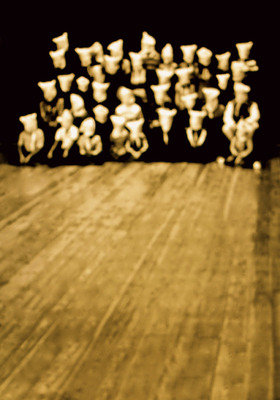Daniel Pesta
dal 28/5/2013 al 29/9/2013
Segnalato da
28/5/2013
Daniel Pesta
Complesso SS. Cosma e Damiano, Venezia
I was born in your bed. Il tema dell'intero progetto e' la "questione rom" intesa come fenomeno sociale. L'artista presenta due grandi video installazioni e un ciclo di ritratti dei bambini rom che hanno partecipato ai video.

Curator: Jürgen Kaumkötter
This is the title under which the Czech artist Daniel Pešta is presenting his project in Venice on the occasion of the 55th edition of the Venice Biennial (La Biennale di Venezia) which falls under the auspices of the City of Venice – Department of Cultural Activities (Città di Venezia – Assessorato alle Attività culturali) and the Mayor of Prague.
On the premises of the Sala del Camino in the former monastery of Saints Cosmas and Damian two videoarts will be presented under the title I WAS BORN IN YOUR BED, as well as the cycle of painted portraits of Roma children performing in the videoart entitled I AM A GYPSY, AND YOU?
The principal theme of the entire project is the current social phenomenon of the Roma question and the stance of the individual in facing this issue. The subject of this creative endeavour is concerned above all with the ambivalent relationship of the individual towards the Roma minority, which is often tied in with a range of prejudices.
During the project’s genesis the artist focused on the youngest Roma generation. This is precisely where he sees the key to any future integration of the Roma into the majority of society. This is the reason why Daniel Pešta has attempted in his work to examine not only their feelings but as well the environment of Roma children and their perception of their life chances. This all he has transformed into this artwork.
“When we consider the life of the Roma, we see it as if it were something totally alien to our own being. Let us then imagine a hypothetical situation of a different fate, one in which we were born Romany. Perhaps we would find unforeseen patterns of behaviour within ourselves and we would begin to act in a peculiar manner, the kind which today one simply refers to as being ‘problematical‘. Perhaps this is down to simple self-preservation, maybe it is due to fear or resignation. However, not one of these factors is compatible with the word ‘hope‘ ”, says Daniel Pešta.
The videoart is composed of two six-metre projections. The entire concept is constructed on the simple principle of a school photograph. Two classes of small children, one of girls, one of boys, stand in typical neatly arranged rows, as we all know from our own school days snapshots. In their hands the children hold white transparent cloth satchels similar to those in which one carries indoor shoes for changing into. The children take their places. Their movement is minimal. After a while an adult strong voice can be heard, calling the name of one of the individual pupils. One by one the children pull the satchels they have ready in their hands over their heads. It is striking how the Roma children voluntarily subject themselves to these orders. This is how one child after another reacts, until they all have their heads covered. The transformation of an individual and a horde has been accomplished.
ARTIST
The Czech multi-media artist Daniel Pešta (born 1959) is represented in a range of European museums and collections. This year he exhibited in the German Bundestag as part of the exhibition Kunst in der Katastrophe.
This project came about with the cooperation and kind assistance of Milan Horvát and the Roma Association of Lysá nad Labem.
PATRONAGE
The City of Venice – Department of Cultural Activities
The Mayor of Prague, Dr. Bohuslav Svoboda, CSc.
Organised by Museum Montanelli, Nerudova 13, 118 00 Prague 1, Czech Republic www.muzeummontanelli.com
Contact: David Kraus info@muzeummontanelli.com mobile phone number +420 724 992 545
The official opening takes place on 29 May at 1800 hours on the premises of the former monastery of Saints Cosmas and Damian (S. Cosma e Damiano) in the Sala del Camino, on the island of Giudecca, Venice.
Sala del Camino
SS. Cosma e Damiano, 621 Giudecca, Venezia
Vaporetto Stop Palanca
Opening times: Tue – Sun 1200 -1800 hours.



